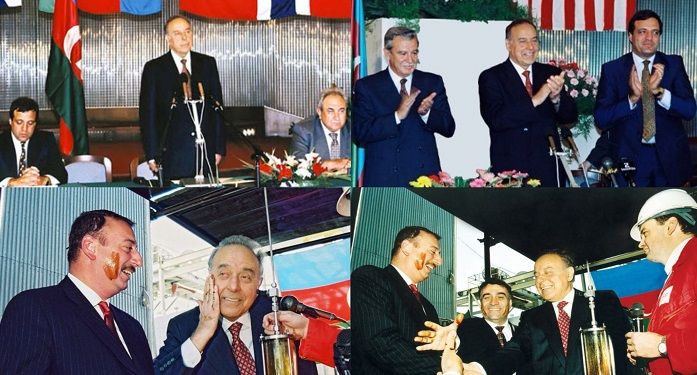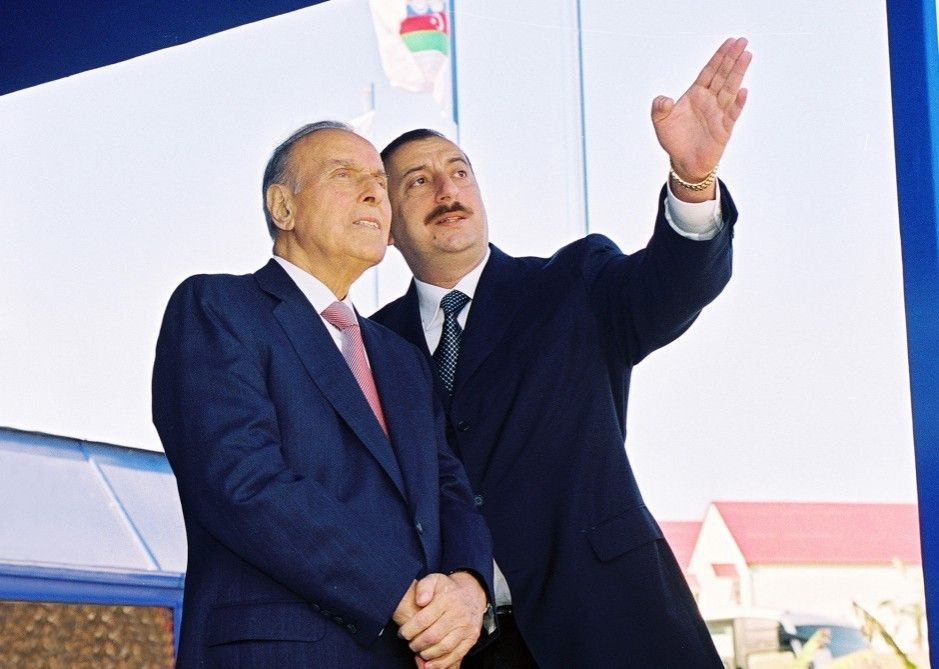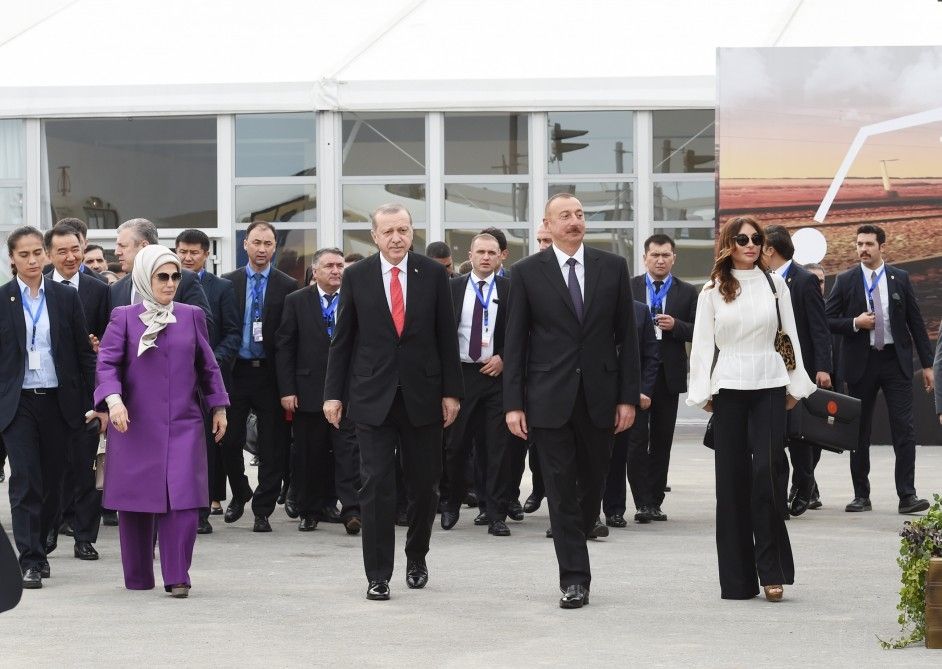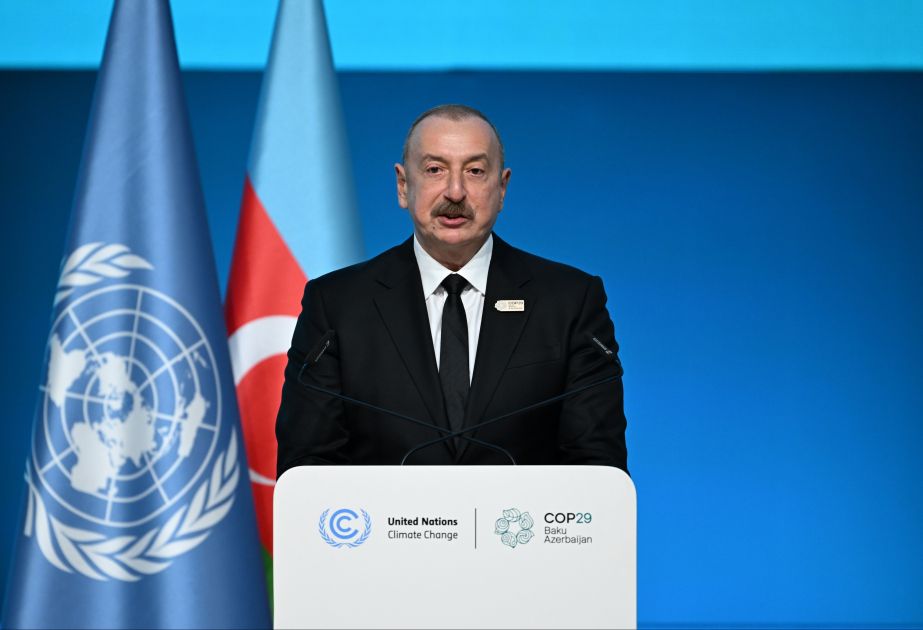|
|
TODAY.AZ / Analytics
Azerbaijan’s economic journey: From Heydar Aliyev’s foundations to Ilham Aliyev’s global reach
12 December 2024 [13:45] - TODAY.AZ

The greatness of historical leaders is often defined by the lasting impact they have on their nations and the world. Their influence resonates long after their time, and their legacy shapes the course of future generations. Azerbaijan’s national leader, Heydar Aliyev, is one such figure whose vision and actions have had a profound influence on the country’s rise to modern prominence. His leadership, characterised by unwavering dedication to Azerbaijan’s independence and prosperity, laid the foundation for a new era for the nation.
Heydar Aliyev's unwavering commitment to the well-being of Azerbaijan can be seen as a defining aspect of his career. Born into a time of tumult, his leadership proved crucial at moments when the survival of the nation was at stake. From the bloody tragedy of January 20, 1990, to the collapse of the Soviet Union, Heydar Aliyev demonstrated exceptional political wisdom, constantly keeping pace with changing times and threats. His return to Azerbaijan from Moscow after years of political exile was nothing short of heroic. At a time when the country teetered on the brink of collapse, his leadership was a beacon of hope for the Azerbaijani people.
Rebuilding the Nation: Heydar Aliyev’s Era of Leadership
In the years following Azerbaijan’s independence in 1991, the country faced immense challenges. The Garabagh conflict, the aftermath of Soviet rule, and internal political instability created an environment of uncertainty. Yet, under Heydar Aliyev’s leadership, Azerbaijan found its path to stability. When Aliyev assumed power in 1993, after a period of crisis and political fragmentation, he set about laying the foundations for a strong and unified state.
The signing of the "Contract of the Century" in 1994 marked the beginning of Azerbaijan’s economic transformation. The discovery of vast oil reserves, along with the development of the Caspian Sea’s natural resources, would provide the nation with a wealth of energy resources, laying the groundwork for future economic growth. In his early years in power, Aliyev took bold steps to establish socio-political stability and economic reforms. The founding of the National Army, the establishment of market reforms, and the adoption of a new constitution set the stage for Azerbaijan's economic ascent.

Under Heydar Aliyev’s guidance, Azerbaijan's economy underwent radical changes. Land reforms were introduced, setting the foundation for a market-driven economy. Infrastructural projects were launched, and the country opened its doors to foreign investors. The growth of the non-oil sector, strategic reforms in the transport and agriculture sectors, and measures to stabilize the banking system helped stabilize the economy.
Azerbaijan's economic reforms, legislative adaptations, and updates to the tax and banking systems have facilitated the country’s integration into the global economy and enhanced its international relations. Initiated under the leadership of a great leader, these reforms resulted in significant economic development. By 2002, the industrial sector's contribution to GDP increased by 12.6 percentage points to 37.4% compared to 1993, with GDP rising by 71.0% from 1996 to 2002 to reach 6.1 billion AZN.
The establishment of socio-political stability attracted domestic and foreign investment, with 8.2 billion AZN invested in production and non-production sectors from 1993 to 2002. This investment led to the construction of significant infrastructure, including housing developments, schools, preschools, and healthcare facilities. Although Azerbaijan faced transport sector crises after gaining independence, these were mitigated by 1996, leading to a 2.4-fold increase in cargo transit by 2002. The revival of the Europe-Caucasus-Asia transport corridor has been crucial for the economy and infrastructure.
Additionally, measures taken to liberalize foreign trade resulted in expanding trade relations, going from 60 countries in 1993 to 128 in 2002, with total trade turnover growing 2.8 times to $3.8 billion. The number of enterprises with foreign investment rose from 602 in 1996 to 2,104 in 2002, while joint ventures increased by 94.1% to 957.
Continuing the vision of his father
As Azerbaijan entered the 21st century, the torch of leadership passed to Heydar Aliyev’s son, Ilham Aliyev. The younger Aliyev, inheriting his father’s political acumen, took the nation’s governance to new heights, building upon the groundwork laid by his father. Ilham Aliyev's leadership in the modern era represents a continuation of the policies and vision that defined Heydar Aliyev’s era, but it also introduced new strategies and reforms that have significantly shaped Azerbaijan’s global standing. It is also worth noting that, Azerbaijan's GDP have risen up 175 times under Aliyev's reign.
Under his leadership, Azerbaijan’s economy has experienced impressive growth, largely due to his forward-thinking economic policies. When Ilham Aliyev assumed the presidency in 2003, the country's GDP stood at around $5 billion. By 2022, this number had surged to approximately $80 billion, reflecting a consistent upward trajectory in economic performance. His presidency marked the beginning of a new era of economic diversification and infrastructural development, building upon the solid foundation set by Heydar Aliyev. Despite facing challenges such as global economic crises, Azerbaijan’s economy showed remarkable resilience, with an average annual GDP growth rate of about 5% during his tenure.

Ilham Aliyev’s commitment to energy security and economic sustainability was instrumental in Azerbaijan’s emergence as an energy hub in the Caspian region. One of the most significant milestones of his presidency was the implementation of the Southern Gas Corridor, a flagship project that ensures Azerbaijan’s natural gas exports to Europe, enhancing the country’s geopolitical importance. This project, costing over $40 billion, has allowed Azerbaijan to supply natural gas to Europe for the first time, with Azerbaijan's gas exports to Europe expected to reach 10 billion cubic meters by 2025. This strategic move not only positioned Azerbaijan as a key energy supplier but also boosted the country’s global influence in the energy sector.
In terms of economic growth, Ilham Aliyev has overseen the development of a robust non-oil sector, ensuring that the country's economic stability isn’t solely dependent on energy exports. The share of Azerbaijan’s non-oil sector in GDP increased significantly from 45% in 2003 to around 70% by 2023, with key industries such as agriculture, tourism, and information technology receiving significant investments. The implementation of large-scale infrastructure projects such as the Baku-Tbilisi-Kars (BTK) railway, new highways, and ports has helped Azerbaijan become a critical transport and logistics hub between Europe and Asia. This has expanded Azerbaijan’s trade relations with countries around the world, improving access to international markets and bolstering its regional influence. In 2022, Azerbaijan’s non-oil exports reached a record high of $3.1 billion, with a 10% growth in manufacturing exports, underscoring the country’s successful efforts at diversification.

Ilham Aliyev’s economic vision emphasized investment in innovation, education, and technology, positioning Azerbaijan as a forward-looking economy. The creation of the Azerbaijan Innovation Agency in 2018 was aimed at supporting technological advances and boosting the country’s capacity for innovation. Investments in the digital economy have led to a significant improvement in e-commerce, with Azerbaijan’s e-commerce sector growing by 24% year-on-year in 2022. Under his leadership, the country has also seen the establishment of several technology parks and innovation hubs, such as the Baku High Tech Park, designed to foster local startups and attract foreign investments.
Perhaps most importantly, Ilham Aliyev has placed a strong emphasis on social development and poverty reduction, seeking to create a balanced economy where citizens benefit from the country’s wealth. During his presidency, the poverty rate was reduced from 49% in 2003 to below 5% by 2023, thanks to a range of social programs aimed at improving the quality of life for Azerbaijani citizens.
In the international arena, Ilham Aliyev has maintained Azerbaijan's neutrality while strengthening its alliances with regional and global powers. His foreign policy focus has been on building strategic partnerships with key countries, such as Turkey, the European Union, and the United States. Azerbaijan’s relations with the European Union have grown particularly strong, with trade turnover between Azerbaijan and the EU reaching $20 billion in 2022, up from just $1.5 billion in 2003. This has been a result of his leadership in promoting Azerbaijan as a key partner in regional energy projects and trade agreements.
Moreover, Ilham Aliyev's leadership played a pivotal role in the liberation of Azerbaijani territories during the Second Garabagh War in 2020. Following the signing of a ceasefire agreement, Azerbaijan regained control of more than 15,000 square kilometers of its land, a strategic victory that not only reaffirmed Azerbaijan’s territorial integrity but also secured a long-term peace in the region. WIth the revival and reintegration of the freed lands, it promised wide opportunities to increase the economic potential of the country in general. The successful implementation of the "I State Program on the Great Return to the Territories Freed from Occupation of the Republic of Azerbaijan" is of great importance in this regard.
Most recently, Ilham Aliyev's leadership has been recognized on the global stage, with Azerbaijan playing a prominent role at the 29th UN Climate Change Conference (COP29). At the summit, held in Dubai in December 2024, Azerbaijan stood out for its proactive stance on climate change and its contribution to global environmental efforts. Under Ilham Aliyev's guidance, Azerbaijan has made significant strides toward transitioning to a greener economy, while maintaining its energy security. Azerbaijan’s efforts were particularly noted in the field of climate finance and green energy development. The country has committed to reducing carbon emissions by 40% by 2030, a goal that aligns with its broader green agenda. At COP29, Azerbaijan set a new global target to channel $1.3tn of climate finance to developing countries by 2035 in significant uplift. This includes a new core finance goal of $300bn that triples the previous $100bn target.

So, on December 12 in the day of remembrance for Azerbaijan's National Leader, Heydar Aliyev, we take pride in recalling the strategic steps he implemented to safeguard Azerbaijan's independence, strengthen our statehood, and promote economic development. His legacy and the continuing success under Ilham Aliyev’s leadership provide an inspiring example of how political wisdom, dedication to national interests, and visionary leadership can transform a country and secure a brighter future for its people.
URL: http://www.today.az/news/analytics/255540.html
 Print version
Print version
Connect with us. Get latest news and updates.
See Also
- 17 January 2026 [20:50]
Azerbaijan growing gas exports to Germany and Austria win for economy and diplomacy - 17 January 2026 [08:30]
Zangezur Corridor and Charaña parallel: Lessons from past transit disputes - 16 January 2026 [08:30]
Middle Corridor shows why process matters more than maps - 15 January 2026 [13:58]
Unrest in Iran sparks international warnings and diplomatic moves - 15 January 2026 [08:30]
How technical framework pushed Zangazur Corridor one step closer - 14 January 2026 [17:49]
Armenia takes control of its borders as old dependencies from Russia unravel [INTERVIEW] - 14 January 2026 [14:00]
Iran’s harsh rhetoric towards US and what it says about regime insecurity - 14 January 2026 [08:30]
How Azerbaijan using post-war rebuilding to reduce oil dependence - 13 January 2026 [13:47]
How Azerbaijan securing water resources in era of global scarcity - 12 January 2026 [19:15]
What January 3 mean for Trump? - Soleimani and Venezuela's Maduro
Most Popular
 Fuel shortage has hit Yerevan - what prevents it from turning to Azerbaijan?
Fuel shortage has hit Yerevan - what prevents it from turning to Azerbaijan?
 London, Ankara signal deeper trade and defence cooperation
London, Ankara signal deeper trade and defence cooperation
 Minister Uralo?lu outlines 2025 achievements, 2026 infrastructure goals
Minister Uralo?lu outlines 2025 achievements, 2026 infrastructure goals
 Moscow must restrain its own mouthpieces like Solovyov.
Moscow must restrain its own mouthpieces like Solovyov.
 Baku emerges as a pivotal hub in Washington’s Eurasian strategy
Baku emerges as a pivotal hub in Washington’s Eurasian strategy
 Baykar targets 25–30 P180 aircraft per year after Piaggio acquisition
Baykar targets 25–30 P180 aircraft per year after Piaggio acquisition
 Amazon rolls out cloud service for European data sovereignty
Amazon rolls out cloud service for European data sovereignty
